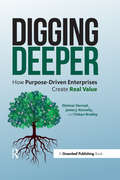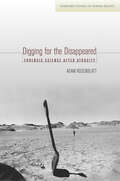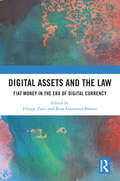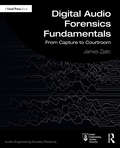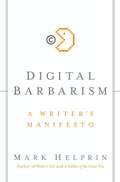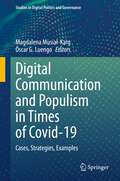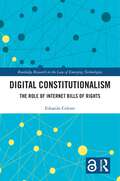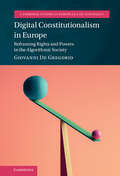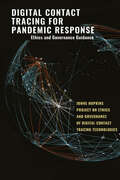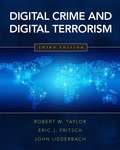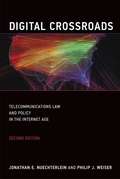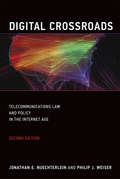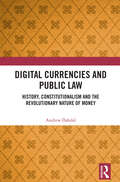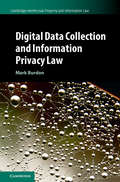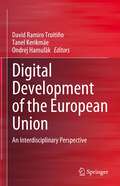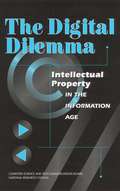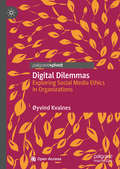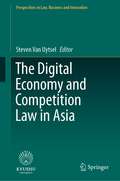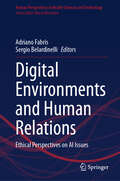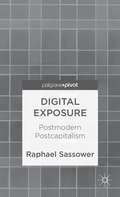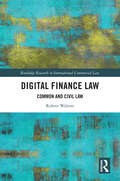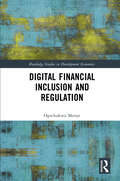- Table View
- List View
A Digest of WTO Jurisprudence on Public International Law Concepts and Principles
by Graham CookIn its first twenty years, the WTO dispute settlement system generated over 350 decisions totalling more than 60,000 pages. These decisions contain many statements by WTO adjudicators regarding the law of treaties, state responsibility, international dispute settlement, and other topics of general public international law. This book is a collection of nearly one thousand statements by WTO adjudicators relating to admissibility and jurisdiction; attribution of conduct to a State; breach of an obligation; conflicts between treaties; countermeasures; due process; evidence before international tribunals; good faith; judicial economy; municipal law; non-retroactivity; reasonableness; sources of international law; sovereignty; treaty interpretation; and words and phrases commonly used in treaties and other international legal instruments. This comprehensive digest presents summaries and extracts organized systematically under issue-specific sub-headings, making this jurisprudence easily accessible to students and practitioners working in any field of international law.
Digging Deeper: How Purpose-Driven Enterprises Create Real Value
by Dietmar Sternad James J. Kennelly Finbarr BradleyWhat is the primary purpose of business? The standard answer is ‘making profits,’ but some visionary entrepreneurs and leaders fundamentally disagree. Instead of just making money, they choose instead to “dig deeper” and make a difference through creating real value – improving the lives of others even as they find deeper meaning in their own. These leaders build enterprises that provide identity and a sense of purpose, create positive relationships and a place to learn and thrive, embed sustainability in all that they do, and strive to improve the quality of life of all of their stakeholders. Although not their primary focus, they also make healthy profits, as their unique approach to value creation provides them with a sustainable competitive edge.Digging Deeper is a book full of inspiring stories that illustrate that there is an alternative to a myopic and narrow capitalism that trades in inequalities, exploitation, collective burnout and negative consequences for our shared natural environment. Remarkable examples from all over the world vividly demonstrate how enterprises can create real value through focusing on what the authors call the 6 Ls: long-term orientation, lasting relationships, local roots, limits recognition, developing a learning community and taking leadership responsibility seriously in its very best sense.Digging Deeper liberates the term “value” from the tight chains in which the global financial community has bound it and demonstrates that businesses can contribute to a better life for all ‒ if their leaders can go beyond viewing enterprises as single-purpose money-making machines and develop purpose-driven enterprises that create real value for all.
Digging for the Disappeared: Forensic Science after Atrocity
by Adam RosenblattThe mass graves from our long human history of genocide, massacres, and violent conflict form an underground map of atrocity that stretches across the planet's surface. In the past few decades, due to rapidly developing technologies and a powerful global human rights movement, the scientific study of those graves has become a standard facet of post-conflict international assistance. Digging for the Disappeared provides readers with a window into this growing but little-understood form of human rights work, including the dangers and sometimes unexpected complications that arise as evidence is gathered and the dead are named. Adam Rosenblatt examines the ethical, political, and historical foundations of the rapidly growing field of forensic investigation, from the graves of the "disappeared" in Latin America to genocides in Rwanda and the former Yugoslavia to post-Saddam Hussein Iraq. In the process, he illustrates how forensic teams strive to balance the needs of war crimes tribunals, transitional governments, and the families of the missing in post-conflict nations. Digging for the Disappeared draws on interviews with key players in the field to present a new way to analyze and value the work forensic experts do at mass graves, shifting the discussion from an exclusive focus on the rights of the living to a rigorous analysis of the care of the dead. Rosenblatt tackles these heady, hard topics in order to extend human rights scholarship into the realm of the dead and the limited but powerful forms of repair available for victims of atrocity.
Digital Afterlife and the Spiritual Realm (Chapman & Hall/CRC Artificial Intelligence and Robotics Series)
by Maggi Savin-BadenFew religious leaders have examined the potential for the positive impact of digital media and digital immortality creation in religious contexts. It is evident that there have been recent moves away from traditional funeral services focusing on the transition of the deceased into the future world beyond, towards a rise of memorial content within funerals and commemorative events. This has heralded shifts in afterlife beliefs by replacing them, to all intents and purposes, by attitudes to this life. Digital Afterlife and the Spiritual Realm explores the ways in which digital media and digital afterlife creation affects social and religious understandings of death and the afterlife. Features Understands the impact of digital media on those living and those working with the bereaved Explores the impact of digital memorialisation post death Examines the ways in which digital media may be changing conceptions and theologies of death For many people, digital afterlife and the spiritual realm largely remains an area that is both inchoate and confusing. This book will begin to unravel some of this bafflement.
Digital Assets and the Law: Fiat Money in the Era of Digital Currency (Routledge-Giappichelli Studies in Law)
by Filippo Zatti and Rosa Giovanna BarresiThis book delves into the intricacies of digital assets. With the increasing reliance on crypto and the potential adoption of digital currencies by central banks, our monetary system is at a critical point. The importance of taking the next step has become even more stringent, as evidenced by this systematic scientific reconstruction.Divided into five concentric parts, the book starts with a historical, technical and financial introduction to digital assets. It then explores the changing role of central banking and monetary economics in the upcoming era. Finally, it focuses on the broad legal issues arising from the new digital landscape, not shying away from exploring forward-thinking solutions and policies for the future.With the contributions of prominent international experts in the field, this collection supplies a transdisciplinary analysis based on the belief that complex phenomena can only be handled by complex solutions. This groundbreaking work aims to be more than just an academic treatise; it is a must-read for students, scholars, financial professionals, and all those who want to understand the emerging digital currency reality that many have yet to fully recognise.
Digital Audio Forensics Fundamentals: From Capture to Courtroom (Audio Engineering Society Presents)
by James ZjalicDigital Audio Forensics Fundamentals offers an accessible introduction to both the theory and practical skills behind this emerging field of forensic science. Beginning with an overview of the history of the discipline, the reader is guided through forensic principles and key audio concepts, before being introduced to practical areas such as audio enhancement, audio authentication, and the presentation of reports. Covering all aspects of audio forensics from the capture to the courtroom, this book is pivotal reading for beginners entering the field, as well as experienced professionals looking to develop their knowledge of the practice.
Digital Barbarism
by Mark HelprinWorld-renowned novelist Mark Helprin offers a ringing Jeffersonian defense of private property in the age of digital culture, with its degradation of thought and language, and collectivist bias against the rights of individual creators. Mark Helprin anticipated that his 2007 New York Times op-ed piece about the extension of the term of copyright would be received quietly, if not altogether overlooked. Within a week, the article had accumulated 750,000 angry comments. He was shocked by the breathtaking sense of entitlement demonstrated by the commenters, and appalled by the breadth, speed, and illogic of their responses. Helprin realized how drastically different this generation is from those before it. The Creative Commons movement and the copyright abolitionists, like the rest of their generation, were educated with a modern bias toward collaboration, which has led them to denigrate individual efforts and in turn fueled their sense of entitlement to the fruits of other people's labors. More important, their selfish desire to "stick it" to the greedy corporate interests who control the production and distribution of intellectual property undermines not just the possibility of an independent literary culture but threatens the future of civilization itself.
Digital Communication and Populism in Times of Covid-19: Cases, Strategies, Examples (Studies in Digital Politics and Governance)
by Magdalena Musiał-Karg Óscar G. LuengoThis book examines different dimensions of digital communication and populism in times of the COVID-19 pandemic. While doing so, it discusses views, opinions, and research results regarding the conditions, experiences, constraints, benefits, and challenges related to the topic - not only using theoretical and methodological approaches but also practical perspectives. The COVID-19 (SARS-CoV-2) pandemic significantly accelerated the technological revolution presenting many social, economic, and political challenges, as it pushed the world into cyberspace to ensure social distancing. At the same time, many populist protests expressed in the digital public sphere massively gained importance during the lockdowns. As a result, one of the most significant consequences of using electronic tools is not only greater e-participation of citizens, but - especially evident through elections during a pandemic - even greater transfer of political communication and election campaigns into the space of new media. The book broadly analyses various contexts of digitalization of communication processes and populist politics from both theoretical and empirical perspectives in various case studies on the digitalization of information, communication, or participation processes during the COVID-19 pandemic in selected European countries and beyond. This book will appeal to students, researchers, and scholars of political communication, political science, electoral studies, digital politics, and democracy, as well as policy-makers interested in a better understanding of digital communication and populism during the Covid-19 pandemic.
Digital Constitutionalism: The Role of Internet Bills of Rights (Routledge Research in the Law of Emerging Technologies)
by Edoardo CelesteInvestigating the impact of digital technology on contemporary constitutionalism, this book offers an overview of the transformations that are currently occurring at constitutional level, highlighting their link with ongoing societal changes. It reconstructs the multiple ways in which constitutional law is reacting to these challenges and explores the role of one original response to this phenomenon: the emergence of Internet bills of rights. Over the past few years, a significant number of Internet bills of rights have emerged around the world. These documents represent non-legally binding declarations promoted mostly by individuals and civil society groups that articulate rights and principles for the digital society. This book argues that these initiatives reflect a change in the constitutional ecosystem. The transformations prompted by the digital revolution in our society ferment under a vault of constitutional norms shaped for ‘analogue’ communities. Constitutional law struggles to address all the challenges of the digital environment. In this context, Internet bills of rights, by emerging outside traditional institutional processes, represent a unique response to suggest new constitutional solutions for the digital age. Explaining how constitutional law is reacting to the advent of the digital revolution and analysing the constitutional function of Internet Bills of Rights in this context, this book offers a global comparative investigation of the latest transformations that digital technology is generating in the constitutional ecosystem and highlights the plural and multilevel process that is contributing to shape constitutional norms for the Internet age.
Digital Constitutionalism in Europe: Reframing Rights and Powers in the Algorithmic Society (Cambridge Studies in European Law and Policy)
by Giovanni De GregorioThis book is about rights and powers in the digital age. It is an attempt to reframe the role of constitutional democracies in the algorithmic society. By focusing on the European constitutional framework as a lodestar, this book examines the rise and consolidation of digital constitutionalism as a reaction to digital capitalism. The primary goal is to examine how European digital constitutionalism can protect fundamental rights and democratic values against the charm of digital liberalism and the challenges raised by platform powers. Firstly, this book investigates the reasons leading to the development of digital constitutionalism in Europe. Secondly, it provides a normative framework analysing to what extent European constitutionalism provides an architecture to protect rights and limit the exercise of unaccountable powers in the algorithmic society. This title is also available as open access on Cambridge Core.
Digital Contact Tracing for Pandemic Response: Ethics and Governance Guidance
by Jeffrey Kahn; Johns Hopkins Project on Ethics and Governance of Digital Contact Tracing TechnologiesAs nations race to hone contact-tracing efforts, the world's experts consider strategies for maximum transparency and impact.As public health professionals around the world work tirelessly to respond to the COVID-19 pandemic, it is clear that traditional methods of contact tracing need to be augmented in order to help address a public health crisis of unprecedented scope. Innovators worldwide are racing to develop and implement novel public-facing technology solutions, including digital contact tracing technology. These technological products may aid public health surveillance and containment strategies for this pandemic and become part of the larger toolbox for future infectious outbreak prevention and control. As technology evolves in an effort to meet our current moment, Johns Hopkins Project on Ethics and Governance of Digital Contact Tracing Technologies—a rapid research and expert consensus group effort led by Dr. Jeffrey P. Kahn of the Johns Hopkins Berman Institute of Bioethics in collaboration with the university's Center for Health Security—carried out an in-depth analysis of the technology and the issues it raises. Drawing on this analysis, they produced a report that includes detailed recommendations for technology companies, policymakers, institutions, employers, and the public. The project brings together perspectives from bioethics, health security, public health, technology development, engineering, public policy, and law to wrestle with the complex interactions of the many facets of the technology and its applications.This team of experts from Johns Hopkins University and other world-renowned institutions has crafted clear and detailed guidelines to help manage the creation, implementation, and application of digital contact tracing. Digital Contact Tracing for Pandemic Response is the essential resource for this fast-moving crisis.Contributors: Joseph Ali, JD; Anne Barnhill, PhD; Anita Cicero, JD; Katelyn Esmonde, PhD; Amelia Hood, MA; Brian Hutler, Phd, JD; Jeffrey P. Kahn, PhD, MPH; Alan Regenberg, MBE; Crystal Watson, DrPH, MPH; Matthew Watson; Robert Califf, MD, MACC; Ruth Faden, PhD, MPH; Divya Hosangadi, MSPH; Nancy Kass, ScD; Alain Labrique, PhD, MHS, MS; Deven McGraw, JD, MPH, LLM; Michelle Mello, JD, PhD; Michael Parker, BEd (Hons), MA, PhD; Stephen Ruckman, JD, MSc, MAR; Lainie Rutkow, JD, MPH, PhD; Josh Sharfstein, MD; Jeremy Sugarman, MD, MPH, MA; Eric Toner, MD; Mar Trotochaud, MSPH; Effy Vayena, PhD; Tal Zarsky, JSD, LLM, LLB
Digital Cowboys: So führen Sie die Generation Playstation
by Pekka A. Viljakainen Mark Müller-EbersteinSie werden die Kultur der Unternehmen schneller verändern, als alle Generationen vor ihnen. Die Digital Cowboys sind in den Unternehmen die Leistungsträger von morgen. Als Digital Natives sind sie mit Social Media und modernen Technologien aufgewachsen. Diese Generation hat ihre eigene Sprache, ihre eigenen Werte und Besonderheiten. Doch wie führt man die Generation Playstation? Kann man sie überhaupt führen oder spielen die Online-Individualisten doch nur nach ihren eigenen Regeln? Eins ist sicher: Mit den Methoden traditioneller Führung und hierarchischem Denken kommen Sie da nicht weiter. Nur keine Angst (No Fear) vor dieser Generation, sagen Pekka Viljakainen und Mark Müller-Eberstein, wenn Sie als Führungskraft bereit sind, sich auf die Bedürfnisse der neuen Mitarbeiter einzustellen. Am besten: nicht ignorieren und sich furchtlos an die Neuerungen wagen, dann werden aus den "individuellen Egoshootern" perfekte Teamplayer mit Höchstleistungspotenzial.
Digital Crime and Digital Terrorism (3rd Edition)
by John Liederbach Robert W. Taylor Eric J. FritschThis book focuses on both the technical aspects of digital crime as well as behavioral aspects of computer hackers, virus writers, terrorists and other offenders. Using real life examples and case studies, the book examines the history, development, extent and types of digital crime and digital terrorism as well as current legislation and law enforcement practices designed to prevent, investigate and prosecute these crimes. For professionals in the technical field as well as forensic investigators and other criminal justice professionals.
Digital Crossroads: Telecommunications Law and Policy in the Internet Age, 2nd ed.
by Jonathan E. Nuechterlein Philip J. WeiserIn "Digital Crossroads," two experts on telecommunications policy offer a comprehensive and accessible analysis of the regulation of competition in the U. S. telecommunications industry. The first edition of "Digital Crossroads" (MIT Press, 2005) became an essential and uniquely readable guide for policymakers, lawyers, scholars, and students in a fast-moving and complex policy field. In this second edition, the authors have revised every section of every chapter to reflect the evolution in industry structure, technology, and regulatory strategy since 2005. The book features entirely new discussions of such topics as the explosive development of the mobile broadband ecosystem; incentive auctions and other recent spectrum policy initiatives; the FCCs net neutrality rules; the National Broadband Plan; the declining relevance of the traditional public switched telephone network; and the policy response to online video services and their potential to transform the way Americans watch television. Like its predecessor, this new edition of Digital Crossroads not only helps nonspecialists climb this fields formidable learning curve, but also makes substantive contributions to ongoing policy debates.
Digital Crossroads, second edition: Telecommunications Law and Policy in the Internet Age
by Jonathan E. Nuechterlein Philip J. WeiserA thoroughly updated, comprehensive, and accessible guide to U.S. telecommunications law and policy, covering recent developments including mobile broadband issues, spectrum policy, and net neutrality.In Digital Crossroads, two experts on telecommunications policy offer a comprehensive and accessible analysis of the regulation of competition in the U.S. telecommunications industry. The first edition of Digital Crossroads (MIT Press, 2005) became an essential and uniquely readable guide for policymakers, lawyers, scholars, and students in a fast-moving and complex policy field. In this second edition, the authors have revised every section of every chapter to reflect the evolution in industry structure, technology, and regulatory strategy since 2005. The book features entirely new discussions of such topics as the explosive development of the mobile broadband ecosystem; incentive auctions and other recent spectrum policy initiatives; the FCC's net neutrality rules; the National Broadband Plan; the declining relevance of the traditional public switched telephone network; and the policy response to online video services and their potential to transform the way Americans watch television. Like its predecessor, this new edition of Digital Crossroads not only helps nonspecialists climb this field's formidable learning curve, but also makes substantive contributions to ongoing policy debates.
Digital Currencies and Public Law: History, Constitutionalism and the Revolutionary Nature of Money
by Andrew DahdalThis book supports the deeper engagement of public lawyers in digital currency developments which threaten dramatic changes in the relationship between individuals and government authorities.No contemporary issue is more widely acknowledged and less understood than that of digital currencies. The voice of constitutional scholars, however, is crucially missing from prevailing digital money discourses. Private law scholars are grappling with the legal questions raised by digital currency models in property and contract. Public law scholars, by contrast, have yet to appreciate the significance of the moment. The challenge of understanding the technical dimensions of digital money innovations has obscured the potential constitutional revolution digital currencies represent. This book proceeds from the proposition that ‘money’ is best conceived as a constitutional phenomenon. When seen as such, it becomes clear that changes in the nature of money represent changes in political and constitutional arrangements. Explaining how, and in what ways, those changes will take place is the primary focus of this book. Through an examination of historical episodes where the nature of money has been linked to renewed constitutional settlements, this book distils a core set of principles linking aspects of monetary innovation such as technical control of the money supply to constitutional positions such as executive fiscal accountability. From these principles, a conceptual framework is proposed that translates the specific attributes of digital currency proposals into the language of constitutional dynamics.The book will be of interest to students, academics and practitioners with an interest in the law of digital currencies, constitutional law and politics.
Digital Data Collection and Information Privacy Law (Cambridge Intellectual Property and Information Law #54)
by Mark BurdonIn Digital Data Collection and Information Privacy Law, Mark Burdon argues for the reformulation of information privacy law to regulate new power consequences of ubiquitous data collection. Examining developing business models, based on collections of sensor data - with a focus on the 'smart home' - Burdon demonstrates the challenges that are arising for information privacy's control-model and its application of principled protections of personal information exchange. By reformulating information privacy's primary role of individual control as an interrupter of modulated power, Burdon provides a foundation for future law reform and calls for stronger information privacy law protections. This book should be read by anyone interested in the role of privacy in a world of ubiquitous and pervasive data collection.
Digital Development of the European Union: An Interdisciplinary Perspective
by David Ramiro Troitiño Tanel Kerikmäe Ondrej HamuľákThis edited volume analyses the digital development of the European Union, presenting an interdisciplinary perspective from the disciplines of political science, international relations, economics, and law. The contributions address the main areas where the EU can, and should act, for creating an efficient and protective digital space in Europe. The book highlights the responsibility of the European Union to work on the future of its digital development, looking for prosperity and defending the European conception of society. It explains how European values must be incorporated into the digital revolution and shows how the digital revolution of the EU will defend the Europeans from new threats. The book's comprehensive approach allows the reader to understand this process without in-depth knowledge of the specific discipline. Therefore, it is a must-read for everybody interested in a better understanding of digital development, European Union policy, and the future of Europe.
The Digital Dilemma: Intellectual Property in the Information Age
by National Research CouncilImagine sending a magazine article to 10 friends-making photocopies, putting them in envelopes, adding postage, and mailing them. Now consider how much easier it is to send that article to those 10 friends as an attachment to e-mail. Or to post the article on your own site on the World Wide Web.The ease of modifying or copying digitized material and the proliferation of computer networking have raised fundamental questions about copyright and patent--intellectual property protections rooted in the U.S. Constitution. Hailed for quick and convenient access to a world of material, the Internet also poses serious economic issues for those who create and market that material. If people can so easily send music on the Internet for free, for example, who will pay for music?This book presents the multiple facets of digitized intellectual property, defining terms, identifying key issues, and exploring alternatives. It follows the complex threads of law, business, incentives to creators, the American tradition of access to information, the international context, and the nature of human behavior. Technology is explored for its ability to transfer content and its potential to protect intellectual property rights. The book proposes research and policy recommendations as well as principles for policymaking.
Digital Dilemmas: Exploring Social Media Ethics in Organizations
by Øyvind KvalnesSocial media is at the core of digital transformations in organizations. Facebook, Twitter, LinkedIn, and other social media platforms widen the scope for rapid and effective communication with stakeholders. They also create a range of new and challenging ethical dilemmas.This open access book categorizes the dilemmas organizations across a range of industries can face when they implement social media to communicate with stakeholders. This book provides a systematic framework for analyzing these ethical dilemmas in social media using the Navigation Wheel. This tool leads the decision-maker through a series of considerations such as legal questions, corporate identity, morality, reputation, and ethics. Finally, the author considers implications for leaders and presents potential solutions to these dilemmas. Based on five years of original research with 250 executive students at a European business school, all of whom work with social media communications in their organizations, this book is the first major study to explore the ethical use of social media across industries and is a valuable resource for researchers and practitioners alike.
The Digital Economy and Competition Law in Asia (Perspectives in Law, Business and Innovation)
by Steven Van UytselThe digital economy, broadly defined as the economy operating on the basis of interconnectivity between people and businesses, has gradually spread over the world. Although a global phenomenon, the digital economy plays out in local economic, political, and regulatory contexts. The problems thus created by the digital economy may be approached differently depending on the context. This edited collection brings together leading scholars based in Asia to detail how their respective jurisdictions respond to the competition law problems evolving out of the deployment of the digital economy. This book is timely, because it will show to what extent new competition law regimes or those with a history of lax enforcement can respond to these new developments in the economy. Academics in law and business strategies with an interest in competition law, both in Asia and more broadly, will find the insights in this edited collection invaluable. Further, this volume will be a key resource for scholars, practitioners and students.
Digital Environments and Human Relations: Ethical Perspectives on AI Issues (Human Perspectives in Health Sciences and Technology #150)
by Adriano Fabris Sergio BelardinelliIn Digital Environments and Human Ecology: New Perspectives on AI Issues, editors and contributors embark on a multidisciplinary exploration of how artificial intelligence (AI) is reshaping the landscapes of human interactions, societal structures, and individual and collective psychologies. Discussing if and to what extent the digital environment can be considered an extension of our environment, this book investigates the profound implications of AI's integration into our daily life, emphasizing the need for a harmonious coexistence between technological advancements and human-centric values, stressing the importance of sustainability in digital development and, therefore, a renewed Human Ecology. By weaving together insights from computer science, social sciences, philosophy, and environmental studies, this book offers a comprehensive and nuanced understanding of the complex relationship between humans and technology. It serves as a vital resource for policymakers, technologists, scholars, and anyone interested in the ethical and ecological implications of digital technologies in our lives.
Digital Exposure: Postmodern Postcapitalism
by Raphael SassowerThis book adopts an explicitly postmodernist perspective of the digital revolution. While exploring issues relating to the re-creation of social life in the digital world, its main focus is on the political economy and in particular the extent to which the paradigms of capitalism and socialism can be mapped as postcapitalism onto this new world.
Digital Finance Law: Common and Civil Law (Routledge Research in International Commercial Law)
by Robert WaltersThis book assesses the rapidly changing landscape of digital finance regulation. Focusing on the laws of banking-finance, tax, insurance, intellectual property (patents and copyright) and international commercial arbitration, it also delves into the regulation of tokens and the laws pertaining to its development, use, and transaction.The book undertakes a comparative study of civil and common law jurisdictions such as Australia, India, Japan, Singapore, United Kingdom, European Union, and the United States. It explores how each jurisdiction is at various stages of developing its digital economy and providing banking and financial regulations for crypto-digital assets such as tokens. It also highlights the potential for global regulatory change and collaboration, such that there is a robust, efficient, and harmonised framework of standards, codes and law. The book asserts that blockchain technology will be a disruptive force to commercial law and will be important to taxation and insurance laws (smart contracts), as well as the technology that supports them. Due to the rapid transformation in regulatory landscape, the laws compared were as at November 2024. Since then there have been changes. It also expands on how international arbitration agreements will require more extensive knowledge on data and cybersecurity due to the use of expert evidence that involves blockchain, code, and cybersecurity, amongst other technological elements that facilitate smart contracts and token transactions.A book of keen interest to scholars of finance law, digital finance, and comparative law, as well as legal practitioners.
Digital Financial Inclusion and Regulation (Routledge Studies in Development Economics)
by Ogochukwu MonyeThis book explores the various considerations for achieving an effective regulatory strategy to improve financial access and usage in Nigeria and beyond. Gaps in the legal and institutional framework for digital financial services (DFS) as well as the barriers that contribute to financial exclusion are identified as are the policy changes needed to provide more extensive, accessible and sustainable financial inclusion value. In addition, the book covers divergent themes around the use of and insights for regulating industry financial services providers and challenger entities that herald industry disruption. The book adopts three research methods. The doctrinal research method is used to buttress the law and development analysis and the themes around regulation, adoption and usage of financial services. To elucidate the application of financial innovations, comparative case studies are drawn from selected jurisdictions including Kenya, South Africa, Ghana, The Philippines, Brazil, Mexico, Uganda, Pakistan, India, and Bangladesh. Lastly, using the empirical research method, the author reports the burden experienced by the residents of a community without banks in accessing finance. Included in this discussion are the barriers to finance as well as the coping strategies adopted by the community residents to access formal and informal finance.

